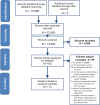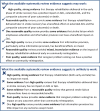Self-Management Support Interventions for Stroke Survivors: A Systematic Meta-Review
- PMID: 26204266
- PMCID: PMC4512724
- DOI: 10.1371/journal.pone.0131448
Self-Management Support Interventions for Stroke Survivors: A Systematic Meta-Review
Abstract
Background: There is considerable policy interest in promoting self-management in patients with long-term conditions, but it remains uncertain whether these interventions are effective in stroke patients.
Design: Systematic meta-review of the evidence for self-management support interventions with stroke survivors to inform provision of healthcare services.
Methods: We searched MEDLINE, EMBASE, CINAHL, PsychINFO, AMED, BNI, Database of Abstracts of Reviews for Effectiveness, and Cochrane Database of Systematic Reviews for systematic reviews of self-management support interventions for stroke survivors. Quality was assessed using the R-AMSTAR tool, and data extracted using a customised data extraction form. We undertook a narrative synthesis of the reviews' findings.
Results: From 12,400 titles we selected 13 systematic reviews (published 2003-2012) representing 101 individual trials. Although the term 'self-management' was rarely used, key elements of self-management support such as goal setting, action planning, and problem solving were core components of therapy rehabilitation interventions. We found high quality evidence that supported self-management in the context of therapy rehabilitation delivered soon after the stroke event resulted in short-term (< 1 year) improvements in basic and extended activities of daily living, and a reduction in poor outcomes (dependence/death). There is some evidence that rehabilitation and problem solving interventions facilitated reintegration into the community.
Conclusions: Self-management terminology is rarely used in the context of stroke. However, therapy rehabilitation currently successfully delivers elements of self-management support to stroke survivors and their caregivers with improved outcomes. Future research should focus on managing the emotional, medical and social tasks of long-term survivorship.
Conflict of interest statement
Figures
References
-
- Rosamond W, Flegal K, Friday G, Furie K, Go A, Greenlund K, et al. (2007) Heart Disease and Stroke Statistics—2007 Update: A Report from the American Heart Association Statistics Committee and Stroke Statistics Subcommittee. Circulation 115: e69–171. - PubMed
-
- World Health Organization. The World Health Report 2003—Shaping the Future Geneva: WHO, 2003.
-
- World Health Organization. (2002) Innovative care for chronic conditions: building blocks for action Geneva: WHO.
Publication types
MeSH terms
Grants and funding
LinkOut - more resources
Full Text Sources
Other Literature Sources
Medical




